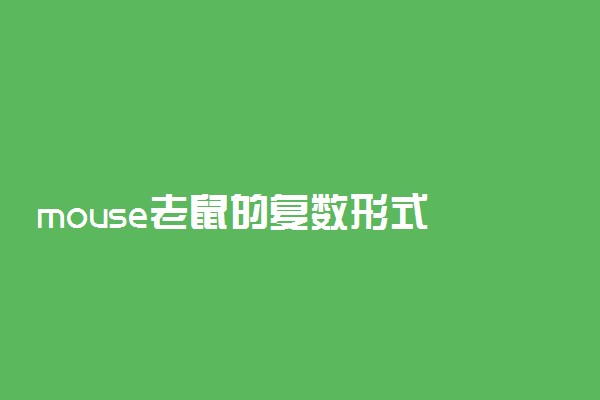mouse的复数形式是mice。mouse的意思是老鼠,耗子,指一种较小的、尾巴细长的啮齿类动物。用于比喻还可指胆小如鼠的人,怕羞的人。mouse在科技术语中,指电脑上的鼠标,光标移动控制盒。

mouse的用法
mouse的意思是老鼠,耗子,指一种较小的、尾巴细长的啮齿类动物。用于比喻还可指胆小如鼠的人,怕羞的人。
mouse在科技术语中,指电脑上的鼠标,光标移动控制盒。
mouse用作名词时意思是鼠,转化为动词意为捕鼠,引申可表示背叛,告发,食言。
mouse一般只用作不及物动词,在口语中常与介词on连用。mouse句中还可用作主语或宾语。
英语名词复数变化规则
一、规则的可数名词的复数变化规则:
1.一般情况加s:book-- books mouth---mouths house---houses girl---girls
2.以s、sh、ch、x结尾的加es:class---classes box----boxes match----matches
3.辅音字母 + y结尾的变y为i加es:city---cities country----countries party----parties factory----factories
4.以o结尾的词+es的只有以下词 :heroes Negroes tomatoes potatoes zeroes/zeros
以o结尾并且词尾有两个元音字母+s:radios, zoos, bamboos ,(pianos ,kilos photos)
5.以f, fe结尾的,变f或fe为v+es:
thief wife life knife wolf half leaf shelf
The thief’s wife killed three wolves with some leaves and knives in half of her life.
二、名词词尾的读音规则
A. 在[ p] [t] [k] [f]等清辅音后读[s] cups, hats, cakes, roofs
B. 在[s] [z] [∫] [t∫]等音后读[iz] glasses, faces, roses.
C.在其他情况下读作[z] beds days cities knives.
D.以th结尾的词原来读[ ] 加词尾后多数读[ ]
如: mouth—mouths path—paths ;
但是也有不变化的,如: month—months, ninth—ninths, youth—youths.
三、不规则的可数名词的变化规则
1.man—men, woman—women, tooth—teeth, foot—feet, goose—geese child—children, mouse—mice,
2.单复数相同: sheep, deer, Chinese, Japanese Swiss.
3.以man, woman 修饰名词构成合成词时,两个词都变化.
man servant—men servants. (boy/girl students